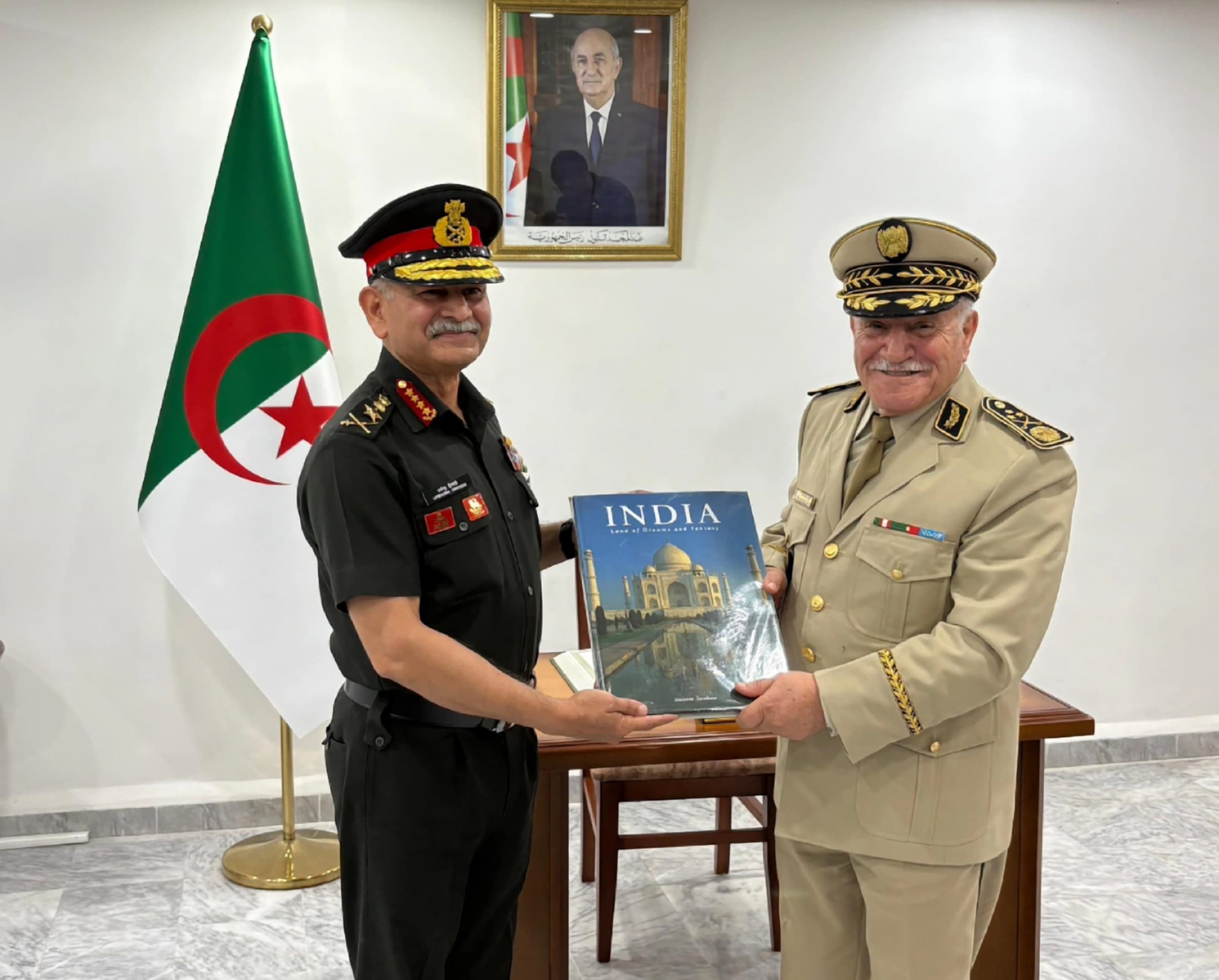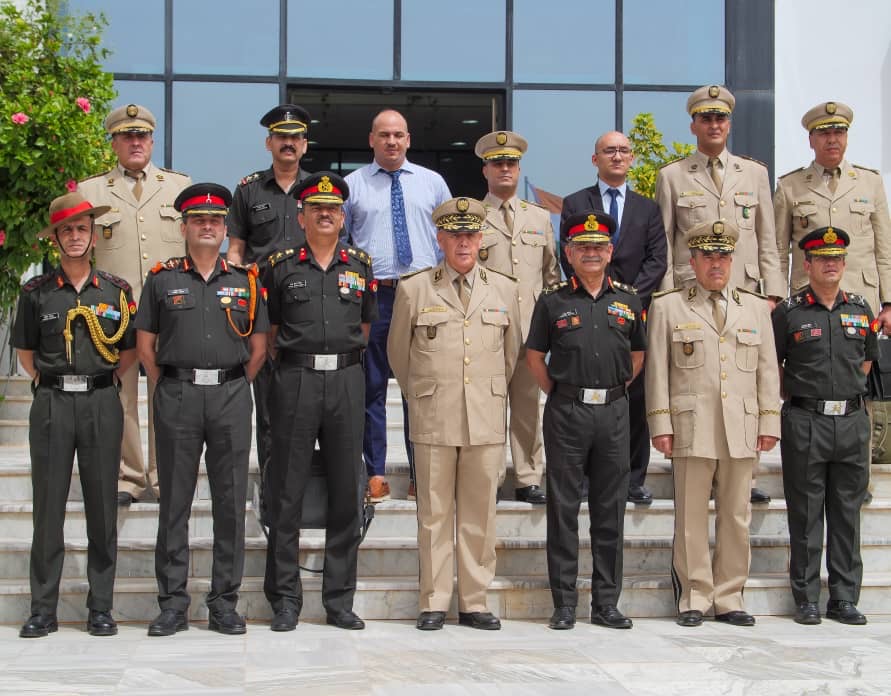Physical Address
Indirizzo: Via Mario Greco 60, Buttigliera Alta, 10090, Torino, Italy
Physical Address
Indirizzo: Via Mario Greco 60, Buttigliera Alta, 10090, Torino, Italy

On a visit to Algiers, the first of its kind, the chief of staff of the Indian Army, General Upendra Dwivedi, granted an exclusive interview to the young independent, in which he delivers his reading on the prospects of military cooperation between Algeria and India, in particular in the joint fight against terrorism and the opportunities of partnership in defense and technology.
The young independent: it is the first visit of a chief of staff of the Indian army in Algeria. What are your first impressions and how do you see the evolution of the defense relationship between the two countries?
General Upendra Dwivedi: India and Algeria have always maintained warm and narrow relationships. Our two countries share a past marked by colonization. India supported Algeria from the start of its release movement. The National Liberation Front (FLN) even opened an office in India in the late 1950s. India was one of the first countries to recognize Algeria as an independent and sovereign nation.
In the 1960s, India leadership within the non-aligned movement was strongly appreciated by Algeria. Our two countries have also shaped their foreign policy on the solid principles of non-alignment.
Today, India and Algeria are facing common security challenges that bring our nations closer more closer. In October 2024, the Indian President made the very first visit of an Indian Head of State in Algeria. Shortly after, the defense chief of staff went to Algeria in the continuity of this presidential visit. On this occasion, a memorandum of understanding in defense cooperation was signed.
We had the honor of welcoming the Minister of Defense in India to the Minister of Defense Said Chanegriha in India last February, during the show Aero India. The delegation led by General of the Army was able to visit four different cities during this stay. The successful holding of the Defense seminar in July 2025 perfectly illustrates the growing partnership between our two countries.
Regarding my visit, I had very fruitful exchanges with the commander of the land forces, the general of the army Mustapha Smaili, during which we established an excellent agreement. This will serve as the basis for our future military cooperation. I was also impressed by the professionalism that I noticed during my visit to the Military Academy of Cherchell, from where I draw precious lessons for our training institutions.

General Upendra Dwivedi with the commander of the land forces General Mustapha Smaili
My exchanges with General Major Aouamari, head of military training, as well as with General Major Badaoui Abdelghani, director of military industries, were also very productive. I am convinced that these interactions will lead to concrete cooperation in the military and defense industry, for mutual benefit from our two armies.
In your opinion, what prospects do you see for a deepening of operational exchanges and cooperation in terms of training between the two armies?
The Indian army attaches great importance to the strengthening of its links with the Algerian National People’s Army. Our two countries are faced with common security challenges in the current geopolitical environment: terrorism, unstable borders, territorial security and coastal, as well as internal security. I see a considerable potential for operational exchanges, especially in the fight against terrorism, the mechanized war, peacekeeping, as well as in emerging fields such as artificial intelligence, drone systems (UAS) and anti-meal offices. These exchanges can take the form of bilateral military exercises, expert seminars or even trade in instructors between our two armies.
There is also a convergence between our two countries with regard to certain common defense equipment. This opens up a large potential for cooperation in the maintenance and maintenance of this equipment.
Training cooperation is the basis of our defense links. We would be in favor of more trading of officers, mutual participation in our training courses, as well as the sharing of our best practices. We could also consider the deployment of training teams adapted to specific needs.
Such collaboration would not only strengthen our respective professional capacities, but also to improve our interoperability, while contributing significantly to regional and global security.
The Pahalgam terrorist attack on April 22, 2025, which led to the death of 26 innocent tourists, was particularly atrocious and loose. You carried out the Sindoor operation in May 2025. What were the main reasons and objectives? Has India achieved these objectives?
The Pahalgam attack, which occurred on April 22, 2025, cost the life of 26 innocent civilians, mainly tourists, in the region of Jammu-et-Cachemire shocked all the Indian people as well as the whole world. This is the attack on the deadliest civilians in India since the Mumbai attacks in 2008. The attackers, linked to Lashkar-E-Taiba (Let) and its emanation, the front resistance (TRF), were located in a neighboring state, which prompted India to react firmly.
The operation targeted nine terrorist camps, including strategic general districts associated with let and Jem. It exclusively targeted terrorist infrastructure, by voluntarily avoiding civil and military areas, which testifies to a measured and proportionate approach.
The Sindoor operation was designed in a thoughtful, non -climbing, proportionate and intended manner to dissuade any additional aggression, while demonstrating the ability of India to act firmly without causing a general escalation. We only used a tiny part of our resources for this operation.
India has largely achieved the objectives it had set for Operation Sindoor. The strikes made it possible to do justice for the Pahalgam attack, by destroying nine major terrorist camps and eliminating key terrorist leaders as well as more than a hundred terrorists. All this was carried out in carefully avoiding civil and military targets, which demonstrated both precision and retained.
The operation sent a clear deterrent message, resulting in a sharp drop in terrorist incidents in Jammu-et-Cachemire in the following months. It has also strengthened national morale and achieved its fundamental objectives: do justice, dissuade, dismantle terrorist infrastructure, and prove India’s ability to act in a responsible but resolved manner.
India has shown significant progress in the field of joint defense and integration technologies. Do you see collaboration opportunities between Algeria and India in this area?
The Indian armed forces have shown notable advances in terms of national industrialization, joint integration and defense technologies as part of the Atmanirbhar Bharat initiative (self -sufficient India). This is a decisive turning point, proving that public defense companies (DPSUS), large industries, SMEs and startups can provide ready -to -use combat solutions for multidomatic operations. This dynamic also illustrates the ability of India to design and export advanced defense systems, inspiring confidence in partners like Algeria, who are looking for reliable, effective solutions in the field.
There are numerous collaboration and technology collaboration opportunities; Our cooperation would focus on joint projects, military exercises and capacity building programs. We would be willing to adapt these mechanisms to the specific needs expressed by Algeria, between the respective armed forces of our two countries.
Joint exercises and training courses are precious tools to share best practices and strengthen our partnerships. Regular visits to our respective countries, the organization of seminars and the conduct of research and development programs are also among our priorities to considerably improve our defense cooperation. A booklet presenting India’s successes in terms of strategic autonomy and its capacities in the defense sector, in particular through the Idex initiative, has already been shared with the Algerian armed forces to feed this future cooperation.
What do you think is the future roadmap for defense cooperation between Algeria and India?
Cooperation between the two countries has a promising future. It is necessary to adopt a multidimensional approach to strengthen defense cooperation between our two large nations and armies. The Algerian armed forces enjoy high status, both by their professionalism and by the solidity of their equipment. Our two armies share common expertise in border management, mechanized war, anti -terrorist fight, humanitarian aid (HADR) and the protection of national interests.
These convergences pave the way for increased cooperation, notably through several stages. First, there is military training where it would be a question of expanding cooperation to military courses, to exchanges of experts in cutting-edge technological fields such as cyber, artificial intelligence, drone systems (UAS) and anti-serial countermeasures. We also consider sending training teams adapted to the specific needs of the Algerian army.
Then there is interoperability. We must develop joint exercises organized alternately in Algeria and India, to strengthen operational coordination.
Add to that regular exchange mechanisms such as dialogues between staff and high-level visits, in order to ensure continuity and strategic orientation.
And finally, there is industrial cooperation by encouraging partnerships in the defense industry sector, in order to support the two countries in the production and maintenance of equipment.
This roadmap aims to build a lasting relationship, beneficial to the two armies and the strategic interests of our nations.
Your message to conclude …
It is with great satisfaction that I will go back to India because the future of cooperation between the two countries is more than promising. Algeria and India will be very close military partners in the future, in particular with the next visit of the Algerian president Abdelmadjid Tebboune in India scheduled for 2026.
